How to test Astro proxy servers for free
07 May 2020
Astro is an ethical data gathering infrastructure suitable for studying markets, working on social media, aggregating information for AI-based machine learning, performing SEO tasks, and other use cases.
Geo targeted proxies offered by Astro include datacenter, residential, and mobile rotating proxies. Trial access is available for free to new users. Acting in strict compliance with KYC and AML policies, we stand against fraud activities of any kind and will be glad for your feedback on detected inconsistencies.
How does Astro proxy free trial work?
The procedure of testing for free supreme proxy pools by our service includes these steps:
- Sign up on the official Astro webpage with your e-mail and phone number. Verify your account through the hyperlink in the message from support@astroproxy.com and enter the code sent to your telephone number.
- Contact client support via Telegram or Facebook to start rotating proxies’ free trial.
- You will get $3 to spend on geo targeted proxies of your choice. All geolocations, API methods, TLS encryption, TCP tunneling, and other features are available for a full-fledged work.
- Unless passing the account verification, a demo mode is available. It allows the use of search engines and information sites, as well as some social networks. To access other web pages the user needs to pass verification or contact client support additionally.
- Enabling two-factor authentication is advised but remains at your discretion.
How to use Astro and perform dynamic proxy free trial
Using free supreme proxies involves the steps similar to our services’ utilization on a commercial basis.
- Check the account’s balance (1) and top it up with a bank card if needed. Complete verification to use cryptocurrency as a means of payment.
- Click “Add port” (2).
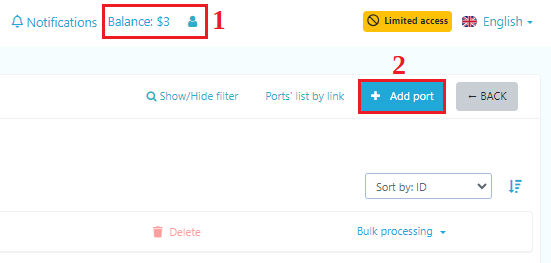
- Detail settings.
Each field matters, and further we will explain available options. For detailed information check the Astro FAQ or consult our client support.
Main terms of paid proxy free trial
Descriptions on each item numbered on the “Port options” illustration are:
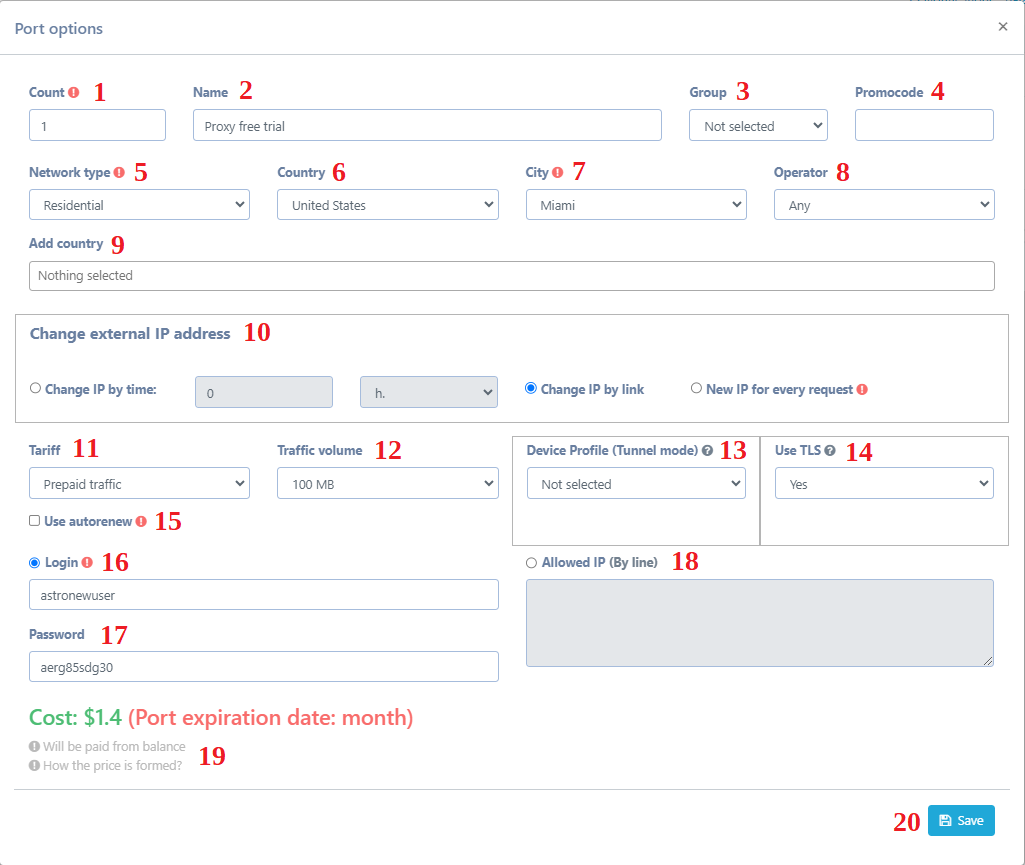
1. Count: number of IPs obtained in bulk. Order as many addresses with the same settings as needed for a dynamic proxy free trial. We recommend applying a separate port for each account, antidetect browser’s profile, scraping thread, etc.
2. Name: new hosts are called “Port+sequence number” by default. Define names in a way reflecting tasks, locations, applied software, etc. Especially useful for teamwork.
3. Group: allows to create and operate clusters of intermediate addresses. Choose a group on the initial stage or batch servers later.
4. Promocode: Astro’s official partners have promo codes. Type them in for a one-time discount for traffic, if you have any. Check the partners’ blog section on our site for manuals on deploying Astro with antidetect browsers.
5. Network type: select between datacenter, residential and mobile IP addresses depending on business cases and needs. This parameter is unavailable for changing after purchase’s completion.
6. Country: prescribe geo targeted proxies location selecting from 100+ countries. Setting “Any” leads our algorithm to pick a random IP pool.
7. City: set a particular pace of preferred hosts’ belonging to enhance their credibility or leave the default value (“Any”).
8. Operator: identifies servers as belonging to particular Internet Service Providers (ISPs) or ASN. We recommend leveraging precise geotargeting on country and city levels, with cellular networks defined for mobile proxies.
9. Add country or exclude it: the box offers two additional grouping possibilities:
- When running datacenter, residential or 4G/5G proxy free trial with predefined country, include additional states to cover larger geographical areas — e.g. European dominions


- Letting our algorithms supply users with addresses from any area, except countries mentioned in the box
10. Change external IP address: no matter what type of network type you define in the ninth item, you get a rotating proxy. Free trial offers dynamic rotation of external IPs. Set up the rotation type:
- By time, at regular intervals, but no more often than 60 seconds.
- Through HTTP-link, URL/GET request.
- Pressing the “Change IP” button on the web dashboard.
- Obtaining a new host at the beginning of a new online session.
Changing IP by time or link suits most occasions. Contact client support for advice or setups for your software. Addresses may change on their own within the established pool to imitate real-user behavior.
11. Tariff: choose a package of traffic or pay as you go. The latter option is more expensive and includes no quantity discounts, while it suits for:
a. Tasks where a large number of ports with a small amount of traffic are used.
b. For testing new geolocations.
12. Traffic volume: there are prepaid packages available from 100 MB to 300 GB. The more you buy, the less every GB costs.
13. Device profile (Tunnel mode): we provide additional end-to-end encryption according to OpenVPN standards. Depending on the chosen device type, you will get an optimized .ovpn file.
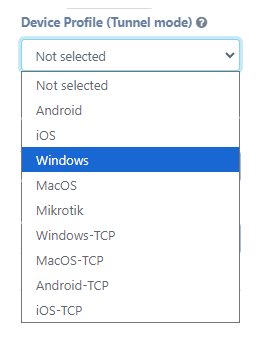
14. Use TLS: encrypts the connection for enhanced security, and is on by default.
15. Autorenew: put the tick in this box to prolong the access to the chosen port automatically on previously selected terms. It happens within a month or when there is about 10% of traffic left.
16. Login: username, set at your option.
17. Password: combination of digits and letters to access a port.
18. Allowed IP (by line): the second sign-in option for accessing your servers. Enter yours or teammates' IP addresses to let them use our system.
19. Cost: the final price, which adjusts dynamically according to:
- Number of ports
- IP type
- Geotargeting levels
- Traffic volume
- Selected tariff
- Applied promo code or discount.
IP rotation mode or OpenVPN settings do not affect the price. Traffic cost is the same for all countries. Hover over the gray font to see details.
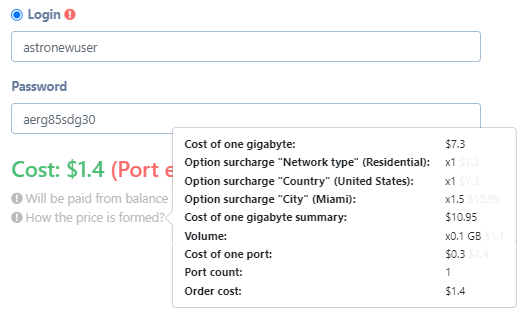
20. Save: press to finalize the selecting procedure. Confirm your decision in the next window or come back to alter any points.
Congratulations! The setup of your paid proxy free trial is finished, and obtained servers have appeared on the dashboard.
Guide on how to maintain Astro's geo targeted proxies
The web interface provides granular supervision over IP lists. Clicking icons with two overlapping squares on the dashboard copies the data to a clipboard for simplified integration with antidetect browsers.
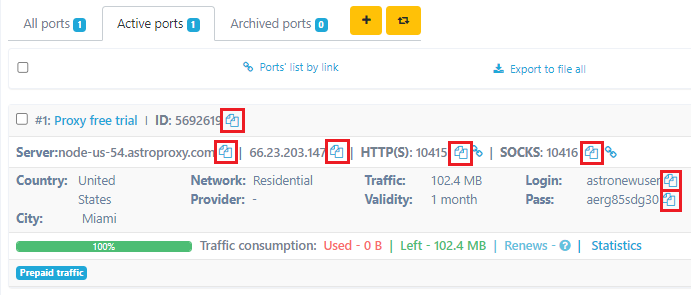
The most important controls are:

- Identification data: the name and ID (useful for API-oriented methods)
- IP: the main dynamic, backconnect address you purchase stays unchangeable, apart from external ones visible to target sites and other users.
- HTTP(S) port: our geo targeted proxies operate both HTTP(S) and SOCKS5. Choose the suitable one.
- SOCKS5 port.
- Login–password: the combination needed for authentication.
- Statistics: opens a new tab with detailed stats on traffic spare, visited web domains, etc.
- Export information for third-party software: required for adding servers to headless and antidetect browsers, scraping or marketing tools, automation robots, and so on. Adjust the template according to external software’s demands and get a .txt file with settings.
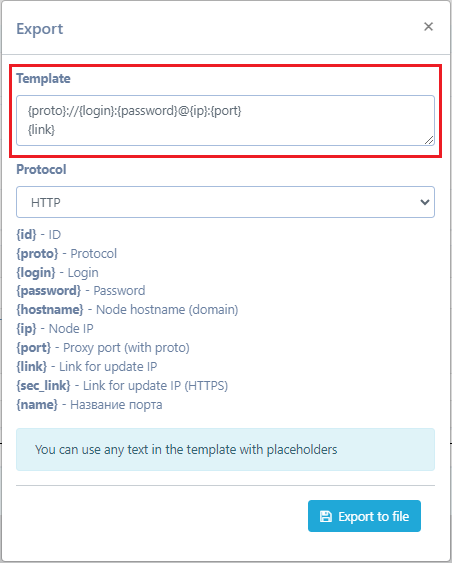
- Maintenance unit: includes buttons for editing, duplication, renewing or deleting the port, and the link to TCP connection’s settings (if Tunnel mode is enabled). Please note that you cannot change the IP type, geolocation and provider after a purchase.
- Manual external address’s rotation: press to get a new IP from the same country, city, and ISP, as stated earlier. The minimal interval is 30 seconds.
Tips on using geo targeted proxies from Astro
Follow these hints for a seamless free rotating proxy trial:
- Leverage our KYC-compliant infrastructure for ethical web scraping and other law-abiding purposes only. We reserve the right to interrupt your paid proxy free trial as a precaution against unethical use of our infrastructure.
- Prefer both country and city-level targeting to pass protective algorithms of websites.
- Do not rotate addresses randomly to keep online credibility.
- Enhance your digital identity with geolocation-based fingerprints and headers.
- Apply the “New IP for every request” mode responsibly. It doesn't suit most internet activities, such as SMM, data collection, browsing, and others. Get a free consultation from our client support when in doubt.
- Working with graphical, headless or antidetect browsers rotate IPs through HTTP requests or URLs.
Manuals on using Astro with antidetect browsers are available in the partners’ section of our site.
Have a read about geo targeted proxies on the official Astro blog and the FAQ section or ask our client support for assistance daily, from 10 AM to 2 AM (UTC+4 GMT).



